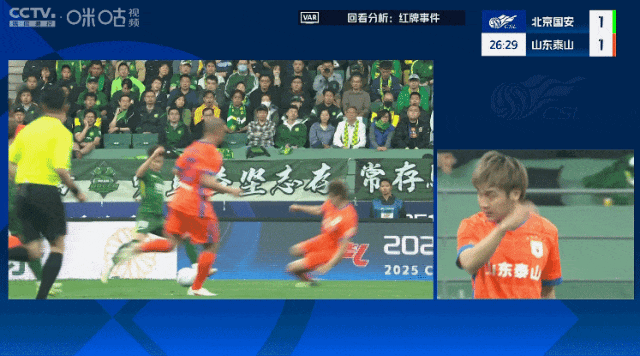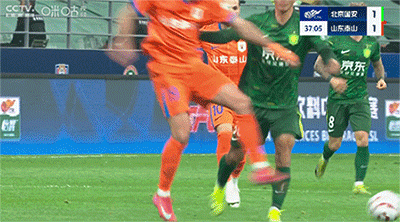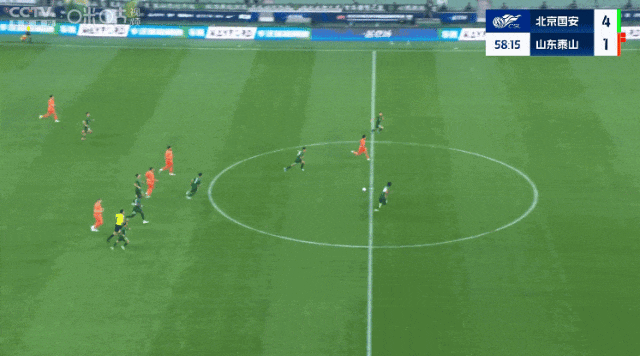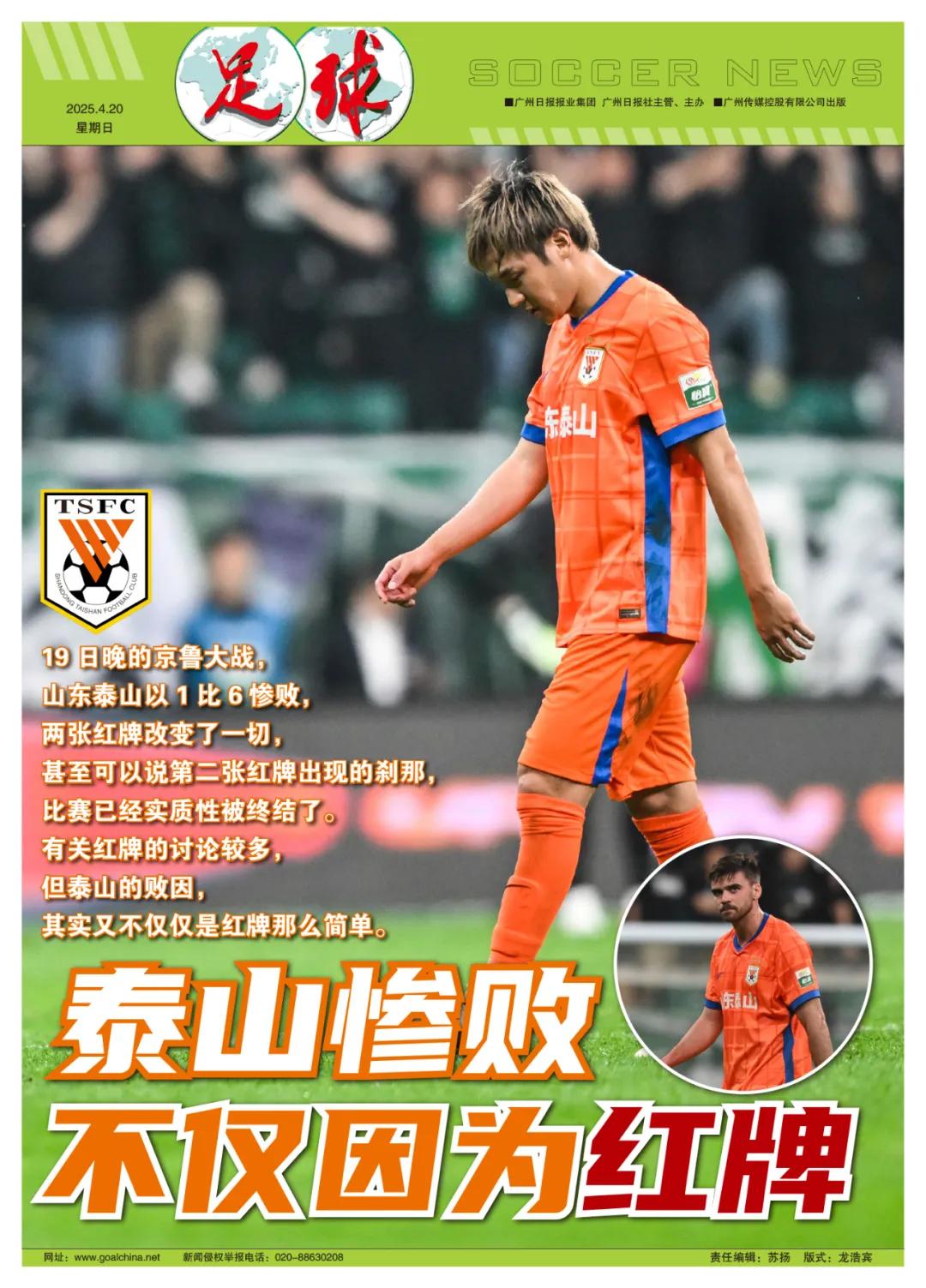Tarzan suffered a 1-6 defeat, and not only because of two red cards

Reporter Chen Yong reports On the evening of the 19th, Shandong Taishan suffered a 1-6 defeat, two red cards changed everything, and it can even be said that the moment the second red card appeared, the game was substantially ended. There is a lot of talk about red cards, but the reason for Taishan's defeat is actually not as simple as a red card.

As in the previous game, the Taishan team started with five foreign aids, and what was even more shocking was that about 5,000 Taishan fans created a great momentum in the southwest corner of the Gongti, and the total number of Guoan fans at home was as high as 54,309 fans.
Just four minutes into the game, Hussen made a mistake under pressure and passed the ball directly to Tarzan's Kazaishvili, who crossed and Zeka easily pushed the ball home. But Guoan did not lose confidence because of this mistake and conceded the goal, in the 15th minute of the game, Guoan tore apart the Taishan defense with a side and a through ball, Serginho and Zhang Yuning delicately cooperated, the latter crossed to help Fabio equalize.

Just when the fans on both sides were worried, in the 25th minute of the game, Wu Xinghan shoveled and fouled in the front court, and after VAR intervened, it was shown that Wu Xinghan's foot was off the ground and shoveled on Lin Liangming's calf, and finally the referee Tang Shunqi showed a red card in the 27th minute of the game and sent Wu Xinghan off. Just 10 minutes later, Zeka grabbed the ball a little slowly and stepped on the inside ankle of Wang Gang's right foot from the side, and Tang Shunqi directly showed a red card. In this way, two members of the Tarzan team were sent off.
The situation of 9 against 11 actually basically meant the end of the game, Beijing Guoan scored in stoppage time in the first half, as well as in the 47th and 52nd minutes of the second half, expanding the score to 4-1 and finally locking the score of 6-1.

As far as the two red cards are concerned, the first one is not too controversial. But the second red card action Zeka was intended to control the ball, and in the case of Wang Gang stabbing the ball away from his side, because of the slow frequency of action, he could not close his foot in time to step on the opponent's ankle - this is a foul with a blurred line, if judged by a single action, it may be blameless from the perspective of referee evaluation, but considering the follow-up process of the game, and the actual situation that Taishan has played one less, it is actually more reasonable to show the yellow card. Previously, there were cases of similar fouls showing yellow cards in the Chinese Super League, and Zeka's slow action was also related to being dragged by the opponent at that time.
As for the red card obtained by the national security team, it is normally "too heavy": Cao Yongjing's foul position is still a long distance from the goal, and Fan Shuangjie also has the possibility of chasing and destroying in a parallel position. This red card, in addition to making Cao Yongjing not very acceptable, the national security players on the field at that time were relatively calm, after all, even if the red card was shown, it was still a numerical advantage of 10 to 9, and the score was 4 to 1 far ahead.


Although Tang Shunqi's penalty in this game was controversial, the defeat of the Taishan team could not be completely blamed on the two red cards.
After the game, Choi Kang-hee rarely expressed his dissatisfaction with the players: "In such an important game, I emphasized not to take cards, and the players were also asked not to tackle the ball in the training ground, I wanted to change the bad habits of the players, but this habit did not change, which caused us to not be able to go according to our own ideas." After the start of the Chinese Super League this season, many games changed the trend of the game because of the red card, Wu Xinghan experienced a downturn, I asked him to change his position, and has been trying to teach him, he is not a seventeen or eighteen-year-old player, such a problem should not occur. At the same time, Choi Kang-hee said that it was not a dangerous area, and there was no need to do such actions. Wu Xinghan's action was indeed a bit reckless, and he did not control his body posture well during the tackle. As for Zeka, it was more like an accident, he was half a beat slower on his feet, while Wang Gang moved faster.
But for Taishan, there are two issues worth exploring: before Wu Xinghan got the red card, the possession rate of the Taishan team at that time was only about 37%, and during that time, the Taishan team only had one threatening attack, while Guoan had already had many threatening attacks. At present, the Taishan team has no midfield control style of play, which will inevitably give the opponent the opportunity to attack again and again, and Guoan is a team with the ability to pass and control, and the pressure on Taishan is very high, and the probability of mental imbalance and action deformation under high pressure is naturally higher.

In fact, a similar situation is more obvious in the home game with Chengdu Rongcheng, the opponent's foreign aid value is much lower than Taishan, Taishan is 8.3 million euros, Chengdu Rongcheng is only 4.5 million euros, that game Taishan team did not have a red card, but from the process to the result is a complete defeat. Subsequently, the Taishan team won three consecutive victories against three middle and lower teams, and seemed to be out of the predicament, including the change of formation, but the dilemma at the tactical level was actually not completely solved.
In addition, most of the high-efficiency offense of the Taishan team is the midfield counter-robbery, if the low defense, the tactical play of the Taishan team is outrageously simple, or find a side foreign aid single, or long pass to hang the hanging, there is not much substantial threat. In this case, the counter-robbery in the midfield is indeed very important, of course, how to reasonably and effectively counter-rob, how to avoid accidental red cards, some situations are indeed worth summarizing.
Overall, this fiasco, the Taishan team's short consecutive red cards in the first half must have been the decisive factor, but Taishan's problems are not only red cards.



Wonderfulshortvideo
Kvaratskhelia and Ronaldo 🫶


🇪🇸 Spain 🆚 Argentina 🇦🇷


When Diogo Costa saved EVERY penalty he faced in the shoot-out 🤯🤯🤯


The movement is electric ⚡️


Never gives up 💪


Things you really love to see


Neymar highlights neymar edit neymar lamine yamal celebration








 Links
Links
 Contact
Contact
 App
App


